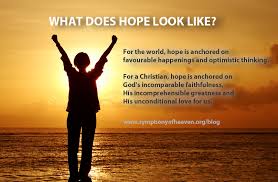
This is how it feels to be hopeless. I identified the feeling as I stood in our dining room in Pittsburgh in 1980. I had never been hopeless before.
How had I come to this place? At the Holy Spirit’s prompting, I had made a commitment to God that I would do anything He asked me to do, go anywhere He asked me to go, be anything He asked me to be (Romans 12:1). I had expected a smooth transition into whatever ministry God had for me. Instead, my life became a nightmare as I went through God’s school of preparation. Would I survive?
My initial symptoms were physical and emotional─dizziness, sensitivity to loud noises, anger, indecisiveness, crying. When I talked to our pastor, he said, “Go home and rest, and read, and pray about the spiritual aspect of your illness.”
 No one had ever given me that kind of advice before, but I obeyed. Soon the Holy Spirit began a deep work. He revealed long-buried hatred, a besetting sin I’d justified, and through our pastor, the possibility of a low-blood sugar problem. My moment of hopelessness came when my Dr. ignored my reactions to the glucose tolerance test, told me my varied and “bizarre” symptoms were “just nerves,” and gave me tranquilizers.
No one had ever given me that kind of advice before, but I obeyed. Soon the Holy Spirit began a deep work. He revealed long-buried hatred, a besetting sin I’d justified, and through our pastor, the possibility of a low-blood sugar problem. My moment of hopelessness came when my Dr. ignored my reactions to the glucose tolerance test, told me my varied and “bizarre” symptoms were “just nerves,” and gave me tranquilizers.
In his chapter titled The God of Hope,* David Wilkerson says, “It has been said that the only thing worse than insanity is despair.” I agree. The doctor to whom I’d looked to solve my problem had done his best and after taking the tranquilizers, I was much worse. I discovered that “Hopelessness is the result of trusting in man.” (David Wilkerson) In the midst of my hopelessness I prayed, “Father, this doctor says my problem is just nerves, but if he’s wrong, please show me.”
A few days later when I picked up a pile of newspapers, a title caught my eye, “A Second Opinion, Please?” The doctor who wrote the  column said that when patients whose conditions had been diagnosed as “nerves” got a second opinion, it was repeatedly found that they had either low blood sugar or allergies. Hope stirred in my heart. Those were the two conditions I’d suspected I might have. I made an appointment with an allergy specialist and went to Carnegie library to read everything I could find on hypoglycemia.
column said that when patients whose conditions had been diagnosed as “nerves” got a second opinion, it was repeatedly found that they had either low blood sugar or allergies. Hope stirred in my heart. Those were the two conditions I’d suspected I might have. I made an appointment with an allergy specialist and went to Carnegie library to read everything I could find on hypoglycemia.
According to these books, my blood sugar readings showed a classic case of hypoglycemia for a person whose blood sugar drops very rapidly even though it may not drop low enough to meet most medical doctor’s criteria. From the allergy doctor, I learned that I was very allergic to molds which were rampant in our damp, finished basement.
I began to follow a high protein diet recommended by nutritionists for low blood sugar, receive allergy shots, and have counseling with our pastor. Gradually I began to get well. My “nerves” greatly improved! Later, when I was having a bad day, Donn prayed for me and God healed me of low blood sugar.
Please understand, I’m not opposed to doctors. We’ve had the same family doctor for 35 years and he’s been a great blessing to us. However, I’ve told him more than once that the reason I appreciate him so much is because he doesn’t think he’s God! It was never God’s plan for us to put our hope and trust in doctors. God is the only One worthy of that. I can’t imagine my condition today, physically, mentally and emotionally, if I hadn’t looked to the Lord for answers, putting my hope and trust in Him alone. Many circumstances and trials may rob us of hope, but if we make God our source of hope, He will bring us through.
Now may the God of hope fill you with all joy and peace in believing, that you may abound in hope by the power of the Holy Spirit (Romans 15:13).
*From David Wilkerson’s book, “Hungry for More of Jesus.”
